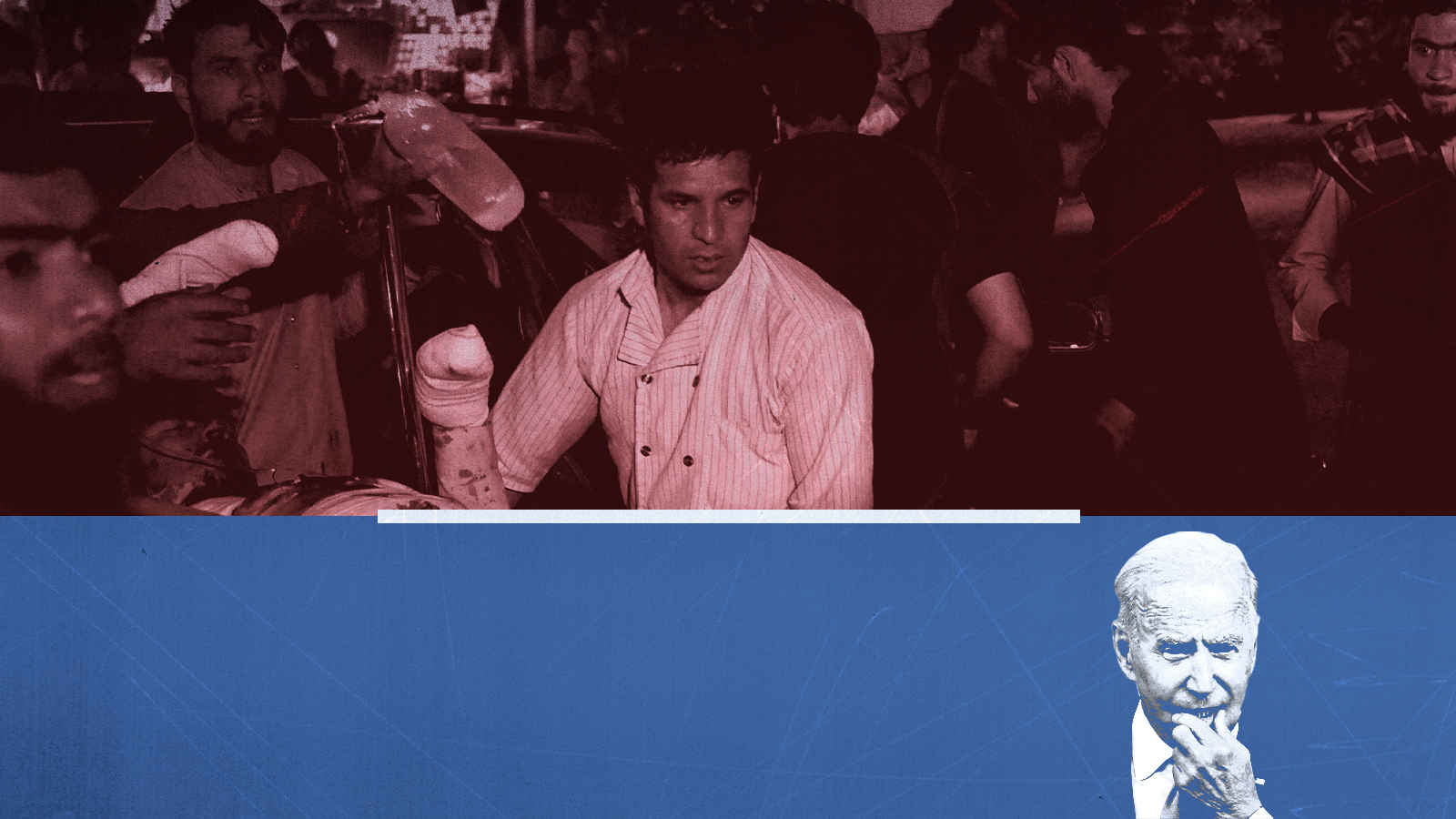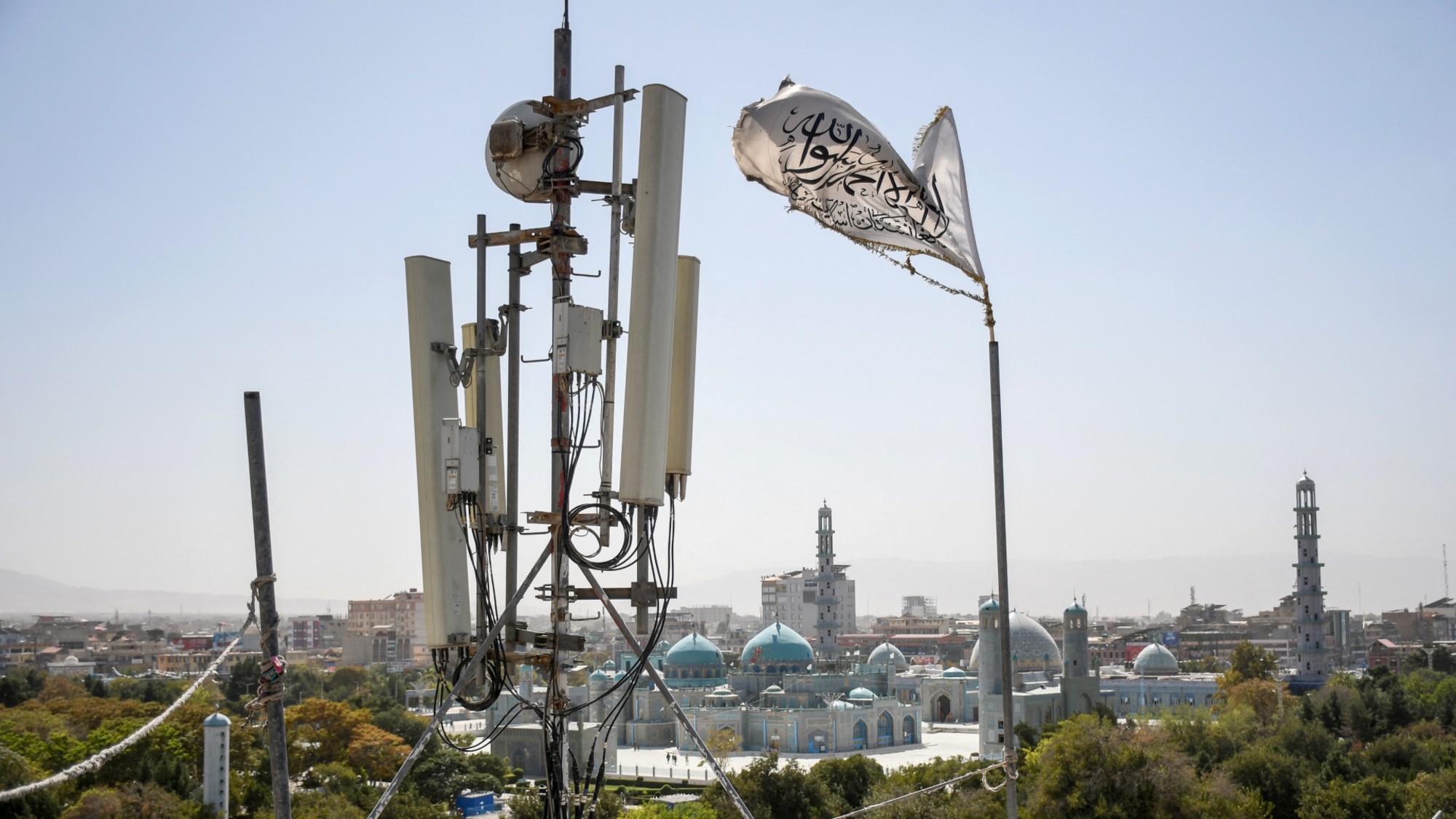Joe Biden's terrible August just got worse
What the Kabul airport attack portends for the president


A free daily email with the biggest news stories of the day – and the best features from TheWeek.com
You are now subscribed
Your newsletter sign-up was successful
We don't yet know how many people, or how many Americans (soldiers or civilians), have been killed or injured in what appears to have been a complex suicide attack at Hamid Karzai International Airport in Kabul, Afghanistan, on Thursday. But one thing we can know with certainty: It doesn't bode well for Joe Biden's presidency.
The case for withdrawing American troops from Afghanistan is strong. The rapid collapse of Afghan military forces and its elected government in the face of a Taliban offensive this summer has demonstrated just how little we've done to create a strong and resilient system in the country over the past 20 years. Add in the deal the Trump administration negotiated with the Taliban for American withdrawal, and Biden was left with the prospect of following through or reneging on it and facing the prospect of a Taliban escalation that required a new American troop surge. Biden personally opposed any such surge, and American public opinion was firmly against it.
But that doesn't mean voters have been happy with scenes coming out of Afghanistan over the past two weeks. It's one thing to favor a withdrawal of troops. It's quite another to be faced with images of victorious members of the Taliban celebrating their triumph over the United States — or of thousands clamoring to flee the country in a chaotic and dangerous scramble at the Kabul airport. It's those images, along with a torrent of sharply critical press coverage of the administration's managing of the withdrawal on the ground, that accounts for most of Biden's precipitous drop in the polls over the past month.
The Week
Escape your echo chamber. Get the facts behind the news, plus analysis from multiple perspectives.

Sign up for The Week's Free Newsletters
From our morning news briefing to a weekly Good News Newsletter, get the best of The Week delivered directly to your inbox.
From our morning news briefing to a weekly Good News Newsletter, get the best of The Week delivered directly to your inbox.
And that was before Thursday's bombings.
In addition to uncertainty surrounding the number of casualties, we also don't yet know who was behind the attack — a faction of the Taliban? Al Qaeda? The Afghan-based "Khorasan" branch of ISIS? Whichever group turns out to have been responsible, the consequences are bound to be bad for Joe Biden in political terms.
America looks weak, confused, on the defensive. The entirety of the national security establishment, including leading members of the military, had already turned on the administration. Our allies have been apoplectic and haven't been shy about sharing their anger and dismay with journalists, many of whom are equally furious about colleagues in Afghanistan facing a dismal future. All of this will now get worse. Much worse, as political friends and enemies at home and abroad seek to distance themselves from and gain advantage in attacking a wounded president.
In political terms, the bipartisan character of the criticism is decisive. In our time of extreme polarization, we've grown used to members of the president's party rallying to his side in times of political turbulence. But that's not what we've seen over the past few weeks, when plenty of Democrats on Capitol Hill have joined with scores of Republicans in speaking out against the way Biden and his team have handled events in Afghanistan. That will only intensify now, as Democrats begin running for cover, aiming to protect themselves from the political fallout.
A free daily email with the biggest news stories of the day – and the best features from TheWeek.com
Then there's the future course of the evacuation process. More than a thousand Americans and many times that many Afghans who assisted us in the country still await removal. Will we be able to bring them safely to the United States over the next few days? Or will additional terrorist attacks — or the threat of such attacks — prevent it, necessitating leaving them behind? And how will that be treated by Biden's lengthening list of political opponents and rivals, who already smell blood in the water?
The president had already locked himself in to several weeks of Afghanistan-focused coverage. That was the risk of him tying our withdrawal to the 20th anniversary of 9/11. What was always going to be a mid-September media frenzy of remembrances tied to that horrific day will now invariably treat it as a story with bookends: the worst civilian attack in American history leading two decades later to a frenzied pullback under enemy fire.
None of this is going to be good for Biden, whose aggregate approval rating will almost certainly be languishing below 45 percent by the time those 9/11 commemorations come to an end. Can a president that weak nonetheless manage to maneuver his ambitious domestic agenda through a narrowly divided Congress? Biden had better hope so, because what would be guaranteed to turn the polling low from a temporary, news-driven soft spot into a new normal is that agenda running aground, leaving the administration without a major accomplishment to run on as the country heads into the midterm elections of 2022.
Was withdrawal the right move? Did the Biden administration bungle the exit? What should come next for America in Afghanistan and the region? We will have plenty of time to argue about how to answer such questions. But the politics of the situation already seem quite clear: Just seven months into his presidency, Joe Biden has gotten himself into serious trouble.
Damon Linker is a senior correspondent at TheWeek.com. He is also a former contributing editor at The New Republic and the author of The Theocons and The Religious Test.
-
 Sepsis ‘breakthrough’: the world’s first targeted treatment?
Sepsis ‘breakthrough’: the world’s first targeted treatment?The Explainer New drug could reverse effects of sepsis, rather than trying to treat infection with antibiotics
-
 James Van Der Beek obituary: fresh-faced Dawson’s Creek star
James Van Der Beek obituary: fresh-faced Dawson’s Creek starIn The Spotlight Van Der Beek fronted one of the most successful teen dramas of the 90s – but his Dawson fame proved a double-edged sword
-
 Is Andrew’s arrest the end for the monarchy?
Is Andrew’s arrest the end for the monarchy?Today's Big Question The King has distanced the Royal Family from his disgraced brother but a ‘fit of revolutionary disgust’ could still wipe them out
-
 The ‘mad king’: has Trump finally lost it?
The ‘mad king’: has Trump finally lost it?Talking Point Rambling speeches, wind turbine obsession, and an ‘unhinged’ letter to Norway’s prime minister have caused concern whether the rest of his term is ‘sustainable’
-
 The billionaires’ wealth tax: a catastrophe for California?
The billionaires’ wealth tax: a catastrophe for California?Talking Point Peter Thiel and Larry Page preparing to change state residency
-
 Bari Weiss’ ‘60 Minutes’ scandal is about more than one report
Bari Weiss’ ‘60 Minutes’ scandal is about more than one reportIN THE SPOTLIGHT By blocking an approved segment on a controversial prison holding US deportees in El Salvador, the editor-in-chief of CBS News has become the main story
-
 Memo signals Trump review of 233k refugees
Memo signals Trump review of 233k refugeesSpeed Read The memo also ordered all green card applications for the refugees to be halted
-
 Has Zohran Mamdani shown the Democrats how to win again?
Has Zohran Mamdani shown the Democrats how to win again?Today’s Big Question New York City mayoral election touted as victory for left-wing populists but moderate centrist wins elsewhere present more complex path for Democratic Party
-
 Millions turn out for anti-Trump ‘No Kings’ rallies
Millions turn out for anti-Trump ‘No Kings’ ralliesSpeed Read An estimated 7 million people participated, 2 million more than at the first ‘No Kings’ protest in June
-
 ‘The Taliban delivers yet another brutal blow’
‘The Taliban delivers yet another brutal blow’Instant Opinion Opinion, comment and editorials of the day
-
 Democrats: Harris and Biden’s blame game
Democrats: Harris and Biden’s blame gameFeature Kamala Harris’ new memoir reveals frustrations over Biden’s reelection bid and her time as vice president
